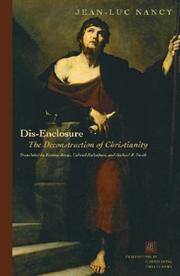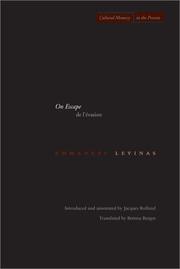Book
Year: 1998 Publisher: New York, NY : New school for social research. Department of Philosophy,
Abstract | Keywords | Export | Availability | Bookmark
 Loading...
Loading...Choose an application
- Reference Manager
- EndNote
- RefWorks (Direct export to RefWorks)
Article
Abstract | Keywords | Export | Availability | Bookmark
 Loading...
Loading...Choose an application
- Reference Manager
- EndNote
- RefWorks (Direct export to RefWorks)

ISBN: 9780823228362 Year: 2008 Publisher: New York (N.Y.) Fordham university press
Abstract | Keywords | Export | Availability | Bookmark
 Loading...
Loading...Choose an application
- Reference Manager
- EndNote
- RefWorks (Direct export to RefWorks)
Article
Abstract | Keywords | Export | Availability | Bookmark
 Loading...
Loading...Choose an application
- Reference Manager
- EndNote
- RefWorks (Direct export to RefWorks)
Book
ISBN: 9780810126664 9780810126657 0810126656 0810126664 Year: 2012 Publisher: Evanston Northwestern university press
Abstract | Keywords | Export | Availability | Bookmark
 Loading...
Loading...Choose an application
- Reference Manager
- EndNote
- RefWorks (Direct export to RefWorks)
Nietzsche, Friedrich Wilhelm, --- Religion. --- Metaphysics. --- Nietzsche, Friedrich Wilhelm --- Nietzsche, Friedrich --- Nietzsche, Friederich
Book
ISBN: 0271065745 9780271065748 9780271066547 0271066547 9780271064994 0271064994 9780271065007 0271065001 Year: 2015 Publisher: University Park, PA
Abstract | Keywords | Export | Availability | Bookmark
 Loading...
Loading...Choose an application
- Reference Manager
- EndNote
- RefWorks (Direct export to RefWorks)
Who is white, and why should we care? There was a time when the immigrants of New York City’s Lower East Side—the Irish, the Poles, the Italians, the Russian Jews—were not white, but now “they” are. There was a time when the French-speaking working classes of Quebec were told to “speak white,” that is, to speak English. Whiteness is an allegorical category before it is demographic.This volume gathers together some of the most influential scholars of privilege and marginalization in philosophy, sociology, economics, psychology, literature, and history to examine the idea of whiteness. Drawing from their diverse racial backgrounds and national origins, these scholars weave their theoretical insights into essays critically informed by personal narrative. This approach, known as “braided narrative,” animates the work of award-winning author Eula Biss. Moved by Biss’s fresh and incisive analysis, the editors have assembled some of the most creative voices in this dialogue, coming together across the disciplines. Along with the editors, the contributors are Eduardo Bonilla-Silva, Nyla R. Branscombe, Drucilla Cornell, Lewis R. Gordon, Paget Henry, Ernest-Marie Mbonda, Peggy McIntosh, Mark McMorris, Marilyn Nissim-Sabat, Victor Ray, Lilia Moritz Schwarcz, Louise Seamster, Tracie L. Stewart, George Yancy, and Heidi A. Zetzer.
Racism. --- Race relations. --- Whites --- Race identity of whites --- Racial identity of whites --- Whiteness (Race identity) --- Race awareness --- Integration, Racial --- Race problems --- Race question --- Relations, Race --- Ethnology --- Social problems --- Sociology --- Ethnic relations --- Minorities --- Racism --- Bias, Racial --- Race bias --- Race prejudice --- Racial bias --- Prejudices --- Anti-racism --- Critical race theory --- Race relations --- Race identity. --- Ethnic identity --- Race identity of white people --- Racial identity of white people --- White people --- White persons --- Caucasian race --- braided narrative critical whites. --- esthetics and film studies. --- imperialism social race" melting pot. --- of race critical. --- privilege white privilege. --- racial self Afrocentrism uBuntu Africana. --- social construction McIntosh. --- sociology of race psychology. --- studies critical race theory race class racism. --- studies feminism. --- theory. --- white people ideology Anglo-Saxonism. --- ".

ISBN: 0804736650 0804736669 Year: 2000 Publisher: Stanford (Calif.) Stanford university press
Abstract | Keywords | Export | Availability | Bookmark
 Loading...
Loading...Choose an application
- Reference Manager
- EndNote
- RefWorks (Direct export to RefWorks)
Levinas as a philosopher may well depend on his assessment of those terms. These lectures offer an excellent introduction to them that shows how they contribute to a wide range of traditional philosophical issues. The lectures are essential to a full understanding of Levinas for three reasons. First, he seeks to explain his thougth to an audience of students, with a clarity and an intensity altogether different from his written work. Second, the themes of God, death and time are not only crucial for Levinas, but they lead him to confront their treatment by the main philosophers of the greet continental tradition. Thus his discussions of accounts of death by Heidegger, Hegel and Bloch place Levinas's thought in a broader context. Third, the basic concepts Levinas employs are those of "Otherwise than being" rather than the earlier "Totality and infinity": patience, obsession, substitution, witness, traumatism. This book consists of transcripts form two lecture courses Levinas delivered in 1975-76, his last year at the Sorbonne. They cover some of the most pervasive themes of his thought and were written at a time when he had just published his most important - and difficult - book, "Otherwise than being, or beyon essence". Both courses pursue issues related to the question at the heart of Levinas's thought: ethical relation. The foreword and afterword place the lectures in teh context of his work as a whole, rounding out this unique picture of Levinas the thinker and the teacher.
Death --- God --- Philosophy --- Time

ISBN: 0804741409 Year: 2003 Publisher: Stanford (Calif.) Stanford university press
Abstract | Keywords | Export | Availability | Bookmark
 Loading...
Loading...Choose an application
- Reference Manager
- EndNote
- RefWorks (Direct export to RefWorks)
Book
ISBN: 9780823237579 Year: 2009 Publisher: New York, NY
Abstract | Keywords | Export | Availability | Bookmark
 Loading...
Loading...Choose an application
- Reference Manager
- EndNote
- RefWorks (Direct export to RefWorks)

ISBN: 9780823237579 9780823228362 Year: 2009 Publisher: New York, N.Y. Fordham University Press
Abstract | Keywords | Export | Availability | Bookmark
 Loading...
Loading...Choose an application
- Reference Manager
- EndNote
- RefWorks (Direct export to RefWorks)

 Search
Search Feedback
Feedback About UniCat
About UniCat  Help
Help News
News